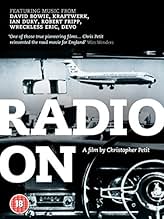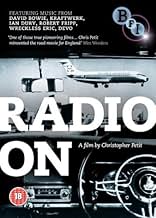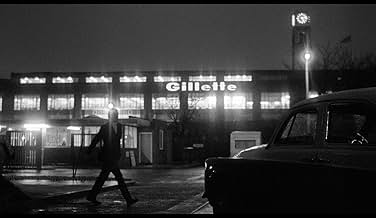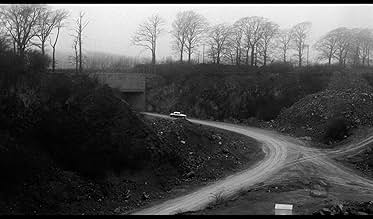Radio On
- 1979
- 1h 44min
PUNTUACIÓN EN IMDb
6,5/10
1,3 mil
TU PUNTUACIÓN
Añade un argumento en tu idiomaIn 1970s Britain, a man drives from London to Bristol to investigate his brother's death, and the purpose of his trip is offset by his encounters with a series of odd people.In 1970s Britain, a man drives from London to Bristol to investigate his brother's death, and the purpose of his trip is offset by his encounters with a series of odd people.In 1970s Britain, a man drives from London to Bristol to investigate his brother's death, and the purpose of his trip is offset by his encounters with a series of odd people.
- Dirección
- Guión
- Reparto principal
- Premios
- 1 premio y 1 nominación en total
Reseñas destacadas
Former Time Out critic, Christopher Petit's directorial debut, Radio On, shows its European credentials well. I say this for a couple of reasons. For one, like the French New Wave participants, Petit began as a film critic, and the sparing nature of this existential road movie, was self- consciously attempting to move British cinema towards a European style. Secondly, and far more telling, is the influence and participation of the New German Cinema of the 1970's. Whilst interviewing Wim Wenders, the subject of Petit's own screenplay arose, and Wenders was impressed. Therefore, Wenders became associate producer, and also lent the use of his cinematographer, Martin Schafer.
Beautifully shot in monochrome, the black and white imagery displays its artful intentions. We follow Robert (David Beames) as he drives from London to Bristol, after being informed that his brother has committed suicide. On his journey, he encounters several unhinged British citizens, including a Glaswegian squaddie with anger management issues, as well as meeting Sting at a petrol station, who seems to be obsessed with Eddie Cochran. Not much really happens in the film, but the most significant (at least the longest) "relationship" is with a German woman, Ingrid (Lisa Kreuzer - who was in Wenders' Alice in the Cities (1974 - Review #96)), who is searching for her missing daughter named Alice (a possible reference to the aforementioned German film.
This is a bleak representation of 1970's Britain. Not a hard task in itself (you could have pointed a camera anywhere in '70's Britain, and it would have been depressing). But what was fundamental to Petit's intentions, was actually a comment on the decline of British cinema. The main output of British cinema was within the prurient genre of the repressed "sex comedies" such as the on-going Carry On.. films, or the equally lamentable Confessions... series with Robin Askwith. When there was any serious attempt at British cinema, they were barely seen. Petit, felt that the Americanisation of our cinema's and the fact that our national cinema was laughable, was decreasing our cultural identity. Radio On is an attempt to move our cinema towards a more European, existential path, and with a more political consciousness.
www.the-wrath-of-blog.blogspot.com
Beautifully shot in monochrome, the black and white imagery displays its artful intentions. We follow Robert (David Beames) as he drives from London to Bristol, after being informed that his brother has committed suicide. On his journey, he encounters several unhinged British citizens, including a Glaswegian squaddie with anger management issues, as well as meeting Sting at a petrol station, who seems to be obsessed with Eddie Cochran. Not much really happens in the film, but the most significant (at least the longest) "relationship" is with a German woman, Ingrid (Lisa Kreuzer - who was in Wenders' Alice in the Cities (1974 - Review #96)), who is searching for her missing daughter named Alice (a possible reference to the aforementioned German film.
This is a bleak representation of 1970's Britain. Not a hard task in itself (you could have pointed a camera anywhere in '70's Britain, and it would have been depressing). But what was fundamental to Petit's intentions, was actually a comment on the decline of British cinema. The main output of British cinema was within the prurient genre of the repressed "sex comedies" such as the on-going Carry On.. films, or the equally lamentable Confessions... series with Robin Askwith. When there was any serious attempt at British cinema, they were barely seen. Petit, felt that the Americanisation of our cinema's and the fact that our national cinema was laughable, was decreasing our cultural identity. Radio On is an attempt to move our cinema towards a more European, existential path, and with a more political consciousness.
www.the-wrath-of-blog.blogspot.com
I had the pleasure of attending a screening of 'Radio On 'presented by its director Chris Petit.
Often described as "austere", and rightly so, the influence of Wim Wenders is immediately clear, but unlike Wenders' which films try to hide a sense of self importance behind lengthy banality it is this film's very understatedness that is the key to its (limited) success.
Halliwell's described this as a film "barely able to summon up any interest in its characters" although it is the very detached and unemotional stance of Petit towards his lead that makes this such an unbearably real portrayal of disenchantment, we begin to feel disenfranchised with humanity itself.
Pointless Trivia: At the premiere screening of this film no one recognised the lead actor amongst the crowd as he has a shock of orange hair undetectable in a black and white movie).
Often described as "austere", and rightly so, the influence of Wim Wenders is immediately clear, but unlike Wenders' which films try to hide a sense of self importance behind lengthy banality it is this film's very understatedness that is the key to its (limited) success.
Halliwell's described this as a film "barely able to summon up any interest in its characters" although it is the very detached and unemotional stance of Petit towards his lead that makes this such an unbearably real portrayal of disenchantment, we begin to feel disenfranchised with humanity itself.
Pointless Trivia: At the premiere screening of this film no one recognised the lead actor amongst the crowd as he has a shock of orange hair undetectable in a black and white movie).
The road movie is among my favorite genres, and "Radio On" ranks with the best of them. Co-produced by Wim Wenders, the master of the existential road movie (whose production company is called "Road Movies," no less), it was made in 1979 by Christopher Petit, who had been a film critic for London's "Time Out" and received funding from Wenders and the British Film Institute to make this film. One very clearly sees an admiration here for Wenders' road trilogy, particularly "Kings of the Road," but "Radio On" extracts the essence of Wenders' style and the soul of the road movie and forms a sort of concentrate from it. This is a meditation *on* the road movie, but on lots of other things, too.
In a film with very long shots and many lonesome scenes with no dialogue, nothing feels superfluous. Lengthy, lingering shots from behind the driver's seat of a moving car with music from Kraftwerk's "Radio-Activity" could very well come across as empty, but in this movie, they don't. Each shot is given ample time to sink in, and they do. Petit has made a movie, rich in its sparseness, that depicts alienation and inward-seeking as effectively as any Wenders film, and like Wenders, there are echoes of Edward Hopper's paintings here in the evening streets lit by streetlights, and in the beautiful moment where we see two characters, British man and German woman, each standing behind separate hotel room windows, staring out pensively as we pass by from a motorway bridge.
The man in the window is Robert, the film's central character, and he is traveling from Camden to Bristol to seek information about the death of his brother. That his name is Robert will likely slip the viewer's mind, as what's important about "Radio On" and the road movies of Wim Wenders is that the central characters are not too sharply drawn, and only a vague set of circumstances are established to give their journey the semblance of purpose. This way, the characters are ciphers, blank slates, and we take this journey with them by inhabiting them, by projecting our own sensibilities onto them, and to that extent, films like "Kings of the Road," "Radio On," and Wenders' later and similar "Until the End of the World" are as purging as a road trip itself.
All of the characters in "Radio On" look like they are brooding, but they don't talk about why, they simply brood and they keep moving while doing so.
Angst and alienation are both factors, but so is the fact that the world is changing. From a small, wintry spot on the globe, change is just around the corner and the characters feel it in their bones, if not yet in their heads.
The energy of the music of David Bowie, Wreckless Eric, Devo and others penetrates the meditative pace and makes these imminent changes palpable in the film's ambiance, or more accurately, in its aura. The movie's calm is an eerie and temporary one, like when the shoreline recedes prior to a tidal wave.
As the title would suggest, the music is one of the principal elements here.
I will indelibly associate Bowie's "Heroes" and Wreckless Eric's "Whole Wide World" with this film. Here, they are like the sun of a new decade rising to melt the snow of the 1970s. Or like a curtain call for an age.
And there is genuine poetry in the dialogue.
The German tourist explains to Robert that her friend hates men. Robert observes, "There's no word for that in English. The only word is for a man who hates women," and we understand that there is sadness in this fact, even if we can't articulate why.
The movie is beautifully conceived and structured, and it is structured both loosely and mindfully. It moves slowly, but it's spontaneous. Sting appears briefly as a filling station attendant, in a wonderful scene where he talks about the death of Eddie Cochran, strums his guitar, and sings "Three Steps to Heaven" from the back of his camper. The film ends as we hear Kraftwerk's "Ohm Sweet Ohm" beaming out from a car radio on the edge of a cliff, and home sweet home is precisely nowhere. This movie is quiet, slow, low-key, but it gets under the skin and is ultimately quite stirring.
In a film with very long shots and many lonesome scenes with no dialogue, nothing feels superfluous. Lengthy, lingering shots from behind the driver's seat of a moving car with music from Kraftwerk's "Radio-Activity" could very well come across as empty, but in this movie, they don't. Each shot is given ample time to sink in, and they do. Petit has made a movie, rich in its sparseness, that depicts alienation and inward-seeking as effectively as any Wenders film, and like Wenders, there are echoes of Edward Hopper's paintings here in the evening streets lit by streetlights, and in the beautiful moment where we see two characters, British man and German woman, each standing behind separate hotel room windows, staring out pensively as we pass by from a motorway bridge.
The man in the window is Robert, the film's central character, and he is traveling from Camden to Bristol to seek information about the death of his brother. That his name is Robert will likely slip the viewer's mind, as what's important about "Radio On" and the road movies of Wim Wenders is that the central characters are not too sharply drawn, and only a vague set of circumstances are established to give their journey the semblance of purpose. This way, the characters are ciphers, blank slates, and we take this journey with them by inhabiting them, by projecting our own sensibilities onto them, and to that extent, films like "Kings of the Road," "Radio On," and Wenders' later and similar "Until the End of the World" are as purging as a road trip itself.
All of the characters in "Radio On" look like they are brooding, but they don't talk about why, they simply brood and they keep moving while doing so.
Angst and alienation are both factors, but so is the fact that the world is changing. From a small, wintry spot on the globe, change is just around the corner and the characters feel it in their bones, if not yet in their heads.
The energy of the music of David Bowie, Wreckless Eric, Devo and others penetrates the meditative pace and makes these imminent changes palpable in the film's ambiance, or more accurately, in its aura. The movie's calm is an eerie and temporary one, like when the shoreline recedes prior to a tidal wave.
As the title would suggest, the music is one of the principal elements here.
I will indelibly associate Bowie's "Heroes" and Wreckless Eric's "Whole Wide World" with this film. Here, they are like the sun of a new decade rising to melt the snow of the 1970s. Or like a curtain call for an age.
And there is genuine poetry in the dialogue.
The German tourist explains to Robert that her friend hates men. Robert observes, "There's no word for that in English. The only word is for a man who hates women," and we understand that there is sadness in this fact, even if we can't articulate why.
The movie is beautifully conceived and structured, and it is structured both loosely and mindfully. It moves slowly, but it's spontaneous. Sting appears briefly as a filling station attendant, in a wonderful scene where he talks about the death of Eddie Cochran, strums his guitar, and sings "Three Steps to Heaven" from the back of his camper. The film ends as we hear Kraftwerk's "Ohm Sweet Ohm" beaming out from a car radio on the edge of a cliff, and home sweet home is precisely nowhere. This movie is quiet, slow, low-key, but it gets under the skin and is ultimately quite stirring.
It comes as no surprise to see Wim Wenders name in the credits. As in most road movies much of this simply consists of a loner staring into space. But former critic Christopher Petit has taken the message "We are the children of Fritz Lang and Werner von Braun" to heart.
As benefits a film that's half-German half the dialogue is in German and the credits are bi-lingual (we even hear David Bowie singing 'We Can Be Heroes' in German), and Petit employs black & white photography to transform North London into an alien environment combining 'Metropolis' and 'Alphaville' (complete with a sinister voice like Alpha-60 emanating from a radio).
Like the earlier films by Lang and Godard it all seemed very modern at the time, but the references to Northern Ireland like Godard's to Algeria and a cameo by Sting make it today look just as much of a period piece as the earlier film. The charmingly archaic computer game seen in a pub is also evocative of an era long ago.
As benefits a film that's half-German half the dialogue is in German and the credits are bi-lingual (we even hear David Bowie singing 'We Can Be Heroes' in German), and Petit employs black & white photography to transform North London into an alien environment combining 'Metropolis' and 'Alphaville' (complete with a sinister voice like Alpha-60 emanating from a radio).
Like the earlier films by Lang and Godard it all seemed very modern at the time, but the references to Northern Ireland like Godard's to Algeria and a cameo by Sting make it today look just as much of a period piece as the earlier film. The charmingly archaic computer game seen in a pub is also evocative of an era long ago.
Filmed in black and white with some great imagery; I love how this film looks with its art-house styling. There is a pretty good soundtrack with songs from the likes of David Bowie, Ian Dury, Kraftwerk and Devo
amongst others. All the performances were good but all delivered in a very 'matter of fact' manner. David Beames took centre stage as Robert with Lisa Kreuzer playing Ingrid. Sandy Ratcliff was Kathy and Andrew Byatt the Deserter but (for me) the star turn was a brief cameo from Sting as the Eddie Cochrane loving petrol pump attendant.
I must admit I was somewhat disappointed by this film. I expected a little more focus on the music for one thing and the fact that everyone in Bristol seemed to speak with a London accent didn't help! It has a very slow pace which I was prepared to accept as long as something happened. Sadly, apart from one bright sequence featuring Sting, not a lot seemed to. There are also sequences where the majority of the dialogue is in German, with no subtitles; very odd! I will give the filmmakers credit for some excellent imagery showing just how bleak an English winter can be (even in the South). Over all I'd say one for lovers of art-house films for them, Recommended for the general cinebuff maybe not.
My Score 6.4/10
IMDb Score: 6.3/10 (based on 296 votes at the time of going to press).
MetaScore: NO DATA: (Based on 0 critic reviews provided by Metacritic.com at the time of going to press).
Rotten Tomatoes 'Tomatometer' Score: NO DATA (based on 0 reviews counted at the time of going to press).
Rotten Tomatoes 'Audience' Score: 12/100 'Want to See' (based on 625 user ratings counted at the time of going to press).
You can find an expanded version of this review on my blog: Thoughts of a SteelMonster.
I must admit I was somewhat disappointed by this film. I expected a little more focus on the music for one thing and the fact that everyone in Bristol seemed to speak with a London accent didn't help! It has a very slow pace which I was prepared to accept as long as something happened. Sadly, apart from one bright sequence featuring Sting, not a lot seemed to. There are also sequences where the majority of the dialogue is in German, with no subtitles; very odd! I will give the filmmakers credit for some excellent imagery showing just how bleak an English winter can be (even in the South). Over all I'd say one for lovers of art-house films for them, Recommended for the general cinebuff maybe not.
My Score 6.4/10
IMDb Score: 6.3/10 (based on 296 votes at the time of going to press).
MetaScore: NO DATA: (Based on 0 critic reviews provided by Metacritic.com at the time of going to press).
Rotten Tomatoes 'Tomatometer' Score: NO DATA (based on 0 reviews counted at the time of going to press).
Rotten Tomatoes 'Audience' Score: 12/100 'Want to See' (based on 625 user ratings counted at the time of going to press).
You can find an expanded version of this review on my blog: Thoughts of a SteelMonster.
¿Sabías que...?
- CuriosidadesIn Britain, this film had a limited release on the art-house circuit in 1980 in a double-bill with a famous film made half-a-century earlier, Luis Bunuel's "L'Age D'Or", which had only recently come off the censor's banned list. One critic remarked that this double-billing meant that he had had both his best and his worst cinema-going experience of 1980 on the same evening.
- ConexionesFeatured in Radio On Remix (1998)
Selecciones populares
Inicia sesión para calificar y añadir a tu lista para recibir recomendaciones personalizadas
- How long is Radio On?Con tecnología de Alexa
Detalles
- Fecha de lanzamiento
- Países de origen
- Idiomas
- Títulos en diferentes países
- Radio on
- Localizaciones del rodaje
- M4, Londres, Inglaterra, Reino Unido(6 High-rise Flats on Green Dragon Lane)
- Empresas productoras
- Ver más compañías en los créditos en IMDbPro
- Duración1 hora 44 minutos
- Color
- Mezcla de sonido
- Relación de aspecto
- 1.85 : 1
Contribuir a esta página
Sugerir un cambio o añadir el contenido que falta

Principal laguna de datos
By what name was Radio On (1979) officially released in India in English?
Responde























